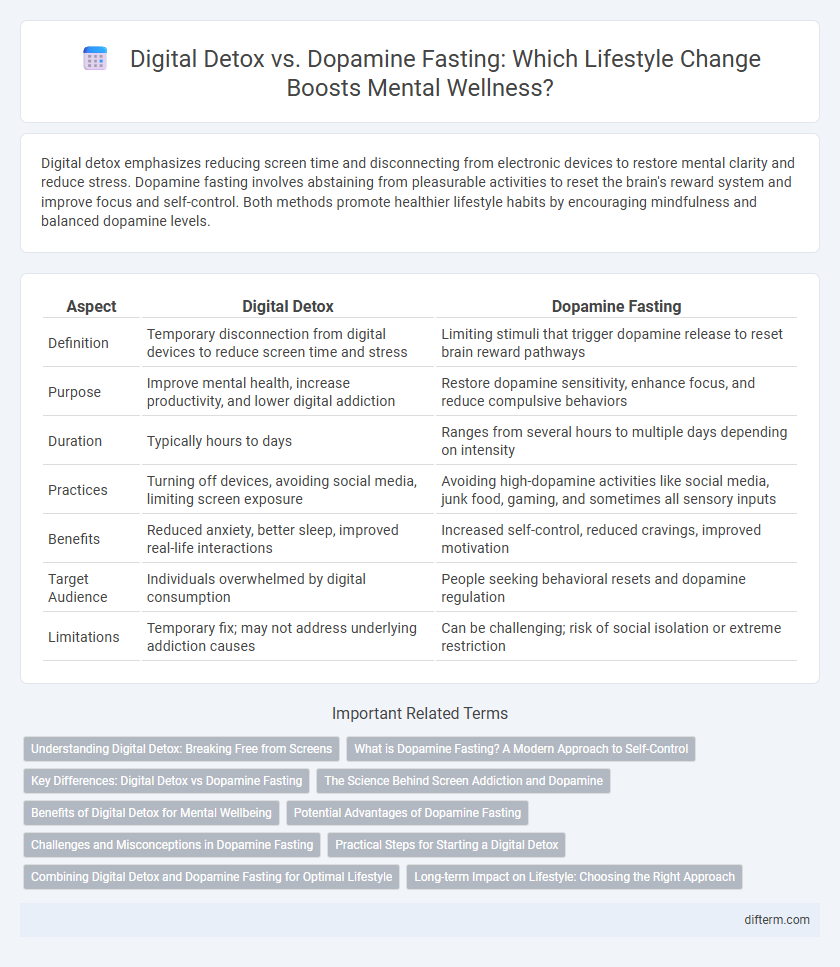Digital detox emphasizes reducing screen time and disconnecting from electronic devices to restore mental clarity and reduce stress. Dopamine fasting involves abstaining from pleasurable activities to reset the brain's reward system and improve focus and self-control. Both methods promote healthier lifestyle habits by encouraging mindfulness and balanced dopamine levels.
Table of Comparison
| Aspect | Digital Detox | Dopamine Fasting |
|---|---|---|
| Definition | Temporary disconnection from digital devices to reduce screen time and stress | Limiting stimuli that trigger dopamine release to reset brain reward pathways |
| Purpose | Improve mental health, increase productivity, and lower digital addiction | Restore dopamine sensitivity, enhance focus, and reduce compulsive behaviors |
| Duration | Typically hours to days | Ranges from several hours to multiple days depending on intensity |
| Practices | Turning off devices, avoiding social media, limiting screen exposure | Avoiding high-dopamine activities like social media, junk food, gaming, and sometimes all sensory inputs |
| Benefits | Reduced anxiety, better sleep, improved real-life interactions | Increased self-control, reduced cravings, improved motivation |
| Target Audience | Individuals overwhelmed by digital consumption | People seeking behavioral resets and dopamine regulation |
| Limitations | Temporary fix; may not address underlying addiction causes | Can be challenging; risk of social isolation or extreme restriction |
Understanding Digital Detox: Breaking Free from Screens
Digital detox involves intentionally disconnecting from electronic devices such as smartphones, computers, and tablets to reduce screen time and mental overload. This practice helps restore attention span, improve sleep quality, and lower stress levels by limiting exposure to constant digital stimuli. Unlike dopamine fasting, which targets the regulation of reward-system responses, digital detox emphasizes overall well-being by fostering presence and real-world engagement.
What is Dopamine Fasting? A Modern Approach to Self-Control
Dopamine fasting is a modern self-control strategy that involves voluntarily abstaining from activities that provide instant gratification, such as social media, video games, and junk food, to reset the brain's reward system. This practice aims to reduce overstimulation and improve focus, motivation, and emotional regulation by limiting dopamine spikes. Unlike traditional digital detoxes that solely target screen time, dopamine fasting emphasizes managing dopamine-driven behaviors across various aspects of daily life.
Key Differences: Digital Detox vs Dopamine Fasting
Digital Detox involves temporarily disconnecting from digital devices to reduce screen time and improve mental well-being, focusing on external stimuli avoidance. Dopamine Fasting targets the brain's reward system by limiting exposure to pleasure-inducing activities, aiming to reset dopamine sensitivity and improve self-control. While both practices promote mindfulness, Digital Detox centers on reducing tech dependency, whereas Dopamine Fasting emphasizes neurochemical balance and behavioral regulation.
The Science Behind Screen Addiction and Dopamine
Screen addiction triggers excessive dopamine release in the brain's reward system, reinforcing compulsive behavior and making digital detox essential for resetting neural pathways. Dopamine fasting involves deliberately reducing stimulation to lower dopamine spikes, helping restore balance and improve self-control. Neuroscientific studies reveal that both strategies target dopamine regulation to mitigate digital dependency and enhance mental well-being.
Benefits of Digital Detox for Mental Wellbeing
Digital detox significantly improves mental wellbeing by reducing screen time, which decreases anxiety and enhances sleep quality. It promotes mindfulness and emotional balance by breaking the cycle of constant digital stimulation. Studies highlight that periodic disconnection from digital devices boosts focus, reduces stress levels, and fosters healthier interpersonal relationships.
Potential Advantages of Dopamine Fasting
Dopamine fasting offers potential advantages such as improved mental clarity and enhanced self-control by deliberately reducing exposure to overstimulating activities that trigger excessive dopamine release. This practice can help reset the brain's reward system, potentially increasing sensitivity to natural rewards and reducing addictive behaviors. By creating periods of intentional abstinence from digital or sensory input, dopamine fasting may foster greater mindfulness and emotional regulation.
Challenges and Misconceptions in Dopamine Fasting
Dopamine fasting presents challenges such as misunderstanding its purpose, often mistaken for complete sensory deprivation rather than a structured reduction of stimulating activities to reset reward pathways. Misconceptions include the belief that dopamine can be entirely "fasted" from, ignoring its essential role in basic functions like movement and motivation. Practitioners must navigate the difficulty of balancing mental health needs with the goal of minimizing overstimulation without inducing isolation or stress.
Practical Steps for Starting a Digital Detox
Starting a digital detox involves setting specific time limits for device use and creating tech-free zones within your home to reduce screen exposure. Practical steps include scheduling regular offline activities like reading, walking, or meditation to replace digital engagement and using apps that monitor and control screen time. Prioritize gradual reduction of notifications and social media usage to minimize withdrawal symptoms and build sustainable habits for improved mental well-being.
Combining Digital Detox and Dopamine Fasting for Optimal Lifestyle
Combining digital detox and dopamine fasting enhances mental clarity and reduces overstimulation by limiting exposure to digital screens and highly stimulating activities, promoting balanced dopamine levels. This integrative approach supports improved focus, emotional regulation, and healthier habits by resetting reward pathways and encouraging mindful engagement with technology. Embracing both strategies simultaneously fosters sustainable lifestyle changes that boost productivity and overall well-being.
Long-term Impact on Lifestyle: Choosing the Right Approach
Digital detox involves reducing screen time to enhance mental clarity and improve sleep quality, supporting sustainable lifestyle changes over months or years. Dopamine fasting centers on limiting stimuli to reset reward pathways, potentially improving focus and self-control but requiring consistent practice for lasting benefits. Evaluating personal goals and habits helps determine whether a gradual detox or a strict fasting regimen aligns better with long-term well-being and productivity.
Digital Detox vs Dopamine Fasting Infographic

 difterm.com
difterm.com